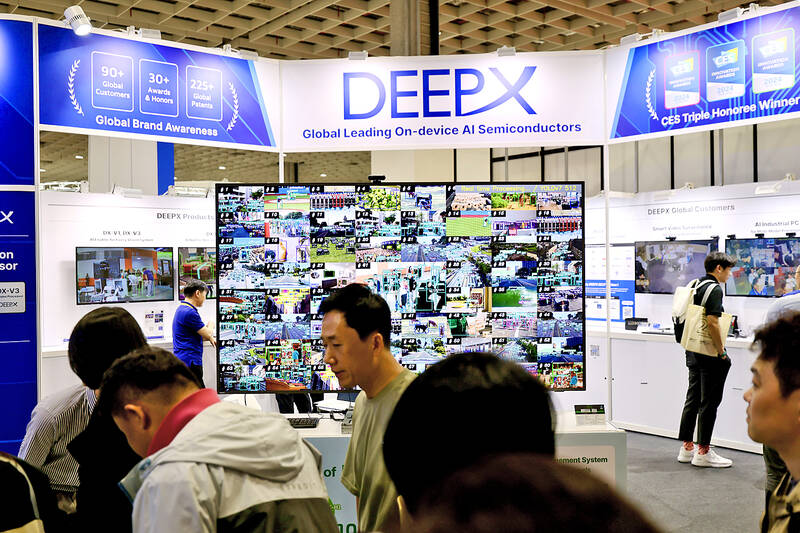Taiwanese firms last month showed more confidence about their six-month business outlook on expectations that demand for artificial intelligence (AI) applications would benefit more sectors, the Taiwan Institute of Economic Research (TIER, 台灣經濟研究院) said yesterday.
The sentiment gauge for local manufacturers printed 99.73, rising 1.07 points from a month earlier to a new 25-month high, as business is expected to flourish for chipmakers, thanks to the arrival of the high sales season for technology products, TIER economist Gordon Sun (孫明德) said.
Semiconductor firms are responsible for making chips used in AI, smartphones, high-performance computing and other applications.

Photo: Ritchie B. Tongo, EPA-EFE
High-end servers would prove another bright spot, Sun said, adding that he is less certain about replacement demand for AI personal computers.
The Taipei-based think tank said that 28.2 percent of local manufacturers are upbeat about their business prospects, while 16.7 percent forecast their business to weaken.
That expectation is because an economic recovery remains uneven as some manufacturers are still struggling with inventory adjustments and sharp competition from regional peers, Sun said.
The challenge is particularly evident for non-tech companies, which have to cope with terminations of favorable tax terms from China, which is axing the number of items that qualified under the Economic Cooperation Framework Agreement, the economist said.
That explained why 70 percent of chemical product suppliers hold flat views about business going forward, while steel makers have unfavorable views, he said.
“It will take longer for all sectors to share the benefit of economic recovery,” he said.
Machinery equipment and base metal product makers are also positive, as inventory adjustments have come to an end and they stand to benefit from public works projects and a renewed property market, Sun said.
The confidence measure for service providers climbed 1.69 points to 97.44, augmenting for three months in a row, the institute said.
Consumer spending remained healthy, but growth momentum slowed somewhat after two consecutive years of “revenge consumption,” Sun said, adding that securities and fund houses put up strong showings on the back of the TAIEX climbing to new highs.
The sentiment readings for construction companies and real-estate brokers rose 2.89 points to 110.05, as housing transactions heated up, aided by interest subsidies and an economic recovery.
TIER said it is not sure if the uptrend could sustain as the Executive Yuan is reviewing favorable lending terms for first-home purchases.
Many have blamed a resurgence of rising housing prices on the government-backed stimulus program. The central bank in the middle of this month tightened its reserve ratio by 25 basis points.

South Korea’s equity benchmark yesterday crossed a new milestone just a month after surpassing the once-unthinkable 5,000 mark as surging global memory demand powers the country’s biggest chipmakers. The KOSPI advanced as much as 2.6 percent to a record 6,123, with Samsung Electronics Co and SK Hynix Inc each gaining more than 2 percent. With the benchmark now up 45 percent this year, South Korea’s stock market capitalization has also moved past France’s, following last month’s overtaking of Germany’s. Long overlooked by foreign funds, despite being undervalued, South Korean stocks have now emerged as clear winners in the global market. The so-called “artificial intelligence

NEW IDENTITY: Known for its software, India has expanded into hardware, with its semiconductor industry growing from US$38bn in 2023 to US$45bn to US$50bn India on Saturday inaugurated its first semiconductor assembly and test facility, a milestone in the government’s push to reduce dependence on foreign chipmakers and stake a claim in a sector dominated by China. Indian Prime Minister Narendra Modi opened US firm Micron Technology Inc’s semiconductor assembly, test and packaging unit in his home state of Gujarat, hailing the “dawn of a new era” for India’s technology ambitions. “When young Indians look back in the future, they will see this decade as the turning point in our tech future,” Modi told the event, which was broadcast on his YouTube channel. The plant would convert

‘SEISMIC SHIFT’: The researcher forecast there would be about 1.1 billion mobile shipments this year, down from 1.26 billion the prior year and erasing years of gains The global smartphone market is expected to contract 12.9 percent this year due to the unprecedented memorychip shortage, marking “a crisis like no other,” researcher International Data Corp (IDC) said. The new forecast, a dramatic revision down from earlier estimates, gives the latest accounting of the ongoing memory crunch that is affecting every corner of the electronics industry. The demand for advanced memory to power artificial intelligence (AI) tasks has drained global supply until well into next year and jeopardizes the business model of many smartphone makers. IDC forecast about 1.1 billion mobile shipments this year, down from 1.26 billion the prior

People stand in a Pokemon store in Tokyo on Thursday. One of the world highest-grossing franchises is celebrated its 30th anniversary yesterday.